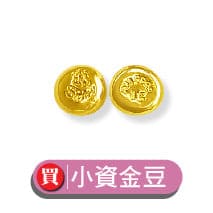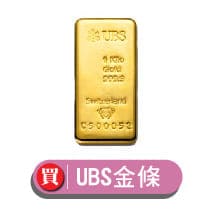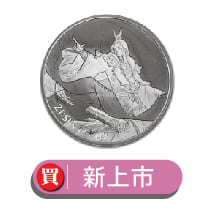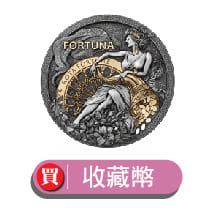2021-06-03 我是黃金臭蟲——因為我見過真正的通貨膨脹和貶值
I'm a Gold Bug—Because I've Seen Real Inflation and Devaluation我是黃金臭蟲*——因為我見過真正的通貨膨脹和貶值
Lobo Tiggre
Thursday May 20, 2021 15:22
**註:“黃金臭蟲”是金融界和經濟學家中經常使用的一個術語,指的是極度看好商品黃金作為投資或衡量財富標準的人。
People often say that Hell hath no fury like a woman scorned. The phrase comes from The Mourning Bride, written by William Congreve in 1697. He put it this way:
人們常說,地獄沒有女人輕蔑的憤怒。這句話來自威廉·康格里夫 (William Congreve) 於 1697 年撰寫的《哀悼的新娘》。他是這樣說的:
Heavn has no rage, like love to hatred turnd,
Nor hell a fury, like a woman scornd.
天堂沒有憤怒,就像愛變成恨一樣,
也不會像女人一樣被蔑視的憤怒。
I think this psychology is relevant to us as speculators today.
我認為這種心理與我們今天的投機者有關。
It certainly applies to more than romance. It explains why religious fanatics seem to hate heretics more than followers of other faiths. Similarly, it fits investors, who, once disappointed, refuse to give a stock a second look—even when a company makes real improvements.
它當然不僅僅適用於浪漫。它解釋了為什麼宗教狂熱者似乎比其他信仰的追隨者更討厭異端。同樣,它也適合投資者,他們一旦感到失望,就會拒絕再看一眼股票,即使這些公司取得了真正的進步。
I think we'll see this psychology in full furious force if—or when—people come to understand that the US dollar is not the secure store of value they imagine.
我認為,如果,或者當人們開始理解美元不是他們想像的安全的價值儲存手段時,我們就會完全憤怒地看到這種心理。
It'll be like a jilted lover in a television comedy who could see no wrong in her beau until his base nature was exposed beyond deniability. Love turns to hate. Virtues turn to vices. The never-do-ill becomes a never-do-well.
這就像電視喜劇中一個被拋棄的情人,直到他的卑鄙本性被無可否認地暴露出來之前,她看不出她的男朋友有什麼問題。愛變成恨。美德變成惡習。不會做的壞事變成了不會做的事。
I can relate to this personally. That's not because I loathe my exes—I don't. My experience is USD-specific.
我個人可以理解這一點。那不是因為我討厭我的前任,我不討厭。我的經驗是特定於美元的。
You see, I can remember the moment when I first learned about inflation…
你看,我還記得我第一次了解通貨膨脹的那一刻……
I was about 11 or 12. We were driving somewhere in Mexico City. Driving anywhere in Mexico City takes hours, or so it seemed to me as a boy, so we had plenty of time to talk. Not long before, I had scrounged old stuff I didn't need or want and held a sort of garage sale on the front porch of our apartment building. I made 500 pesos selling old puzzles, pictures, toy cars, and such. I was very proud of my results—500 pesos seemed like a real fortune! I was telling my mother, who was driving, how I would run a store if I owned one. She was, as ever, positive and encouraging. But at some point, she pointed out that I'd have to deal with inflation. Then she had to explain what that was.
我大約 11 或 12 歲。我們在墨西哥城的某個地方開車。在墨西哥城的任何地方開車都需要幾個小時,或者在我還是個孩子的時候是這樣,所以我們有足夠的時間交談。不久前,我撿到了一些我不需要或不需要的舊東西,並在我們公寓樓的前廊舉辦了一場車庫拍賣。我賣舊的拼圖、圖片、玩具車等等,賺了 500 比索*。我為自己的成績感到非常自豪!500比索看起來真的是一筆財富!我告訴正在開車的母親,如果我擁有一家商店,我將如何經營一家商店。她一如既往地積極和鼓舞人心。但在某些時候,她指出我必須應對通貨膨脹。然後她必須解釋那是什麼。
*註: 比索 Peso, 墨西哥所使用的貨幣
Mind you, this in Mexico in the 1970s. Her explanation wasn't about unanchored expectations or consumer confidence. It was about government policy. Money printing.
請注意,這是 1970 年代的墨西哥。她的解釋不是關於未錨定的期望或消費者信心。這是關於政府政策的事情 -- 印鈔。
This is why everyone in my family in Mexico at the time was saving in US dollars. They hardly evaporated at all compared to pesos. The family still does this today.
這就是為什麼我當時在墨西哥的家人都用美元做為儲蓄的原因。與比索相比,它們幾乎沒有蒸發。然而這個家庭今天依然這樣做。
I was aghast.
我驚呆了。
I felt sick—literally nauseous.
我感到噁心,簡直是噁心。
How could it be that money one worked so hard to earn could simply melt away while one held it? That this was the result of policy was intolerable. Why, they did it on purpose! Like a playground bully, they took from people—hurt people—because they could.
一個人辛辛苦苦掙來的錢,怎麼會在有人拿著的時候就消失了呢?這是政策的結果是不能容忍的。為什麼,他們是故意的!就像操場上的惡霸一樣,他們從人那里奪走,傷害人,因為他們可以。
I don't remember what happened next, but I do remember converting my pesos to dollars the first chance I got. Paying the bank an exchange fee bothered me, but not as much as the idea that my pesos would become worth less and less over time.
我不記得接下來發生了什麼,但我記得我第一次有機會將比索兌換成美元。向銀行支付兌換費(手續費)讓我感到困擾,但並不像我的比索隨著時間的推移變得越來越不值錢的想法那麼困擾。
Once I had converted to dollars, I felt so much better. The relief was almost physical. My hard-earned savings might last longer than ice cream in the sun.
兌換成美元後,我感覺好多了。這種緩解幾乎是身體上的。我辛苦賺來的積蓄可能比陽光下的冰淇淋更持久。
I also started insisting on getting paid in dollars for any chores I did for others, allowances I got, or things I picked up in the US for friends in Mexico.
我也開始堅持要為我為他人做的家務、我得到的津貼或我在美國為墨西哥朋友買的東西獲得美元報酬。
But the real clincher was that some time later, there was a bank holiday and the peso was devaluated overnight. I don't remember the precise numbers or date. It was something like 20 to the dollar one day, and 40 the next.
但真正的關鍵是一段時間後,銀行放假,比索一夜之間貶值。我不記得確切的數字或日期。一天大約是 20 美元,然後是 40 美元。
Since then, there have been many devaluations. I think zeros have been cut off the peso more than once. But that was my first personal experience with devaluation.
從那時起,出現了多次貶值。我認為比索的 “零” 不止一次被切斷。但那是我第一次親身經歷貶值。
Can you imagine how fantastic it felt to have my meager savings in dollars when it happened?
你能想像當它發生時,我以微薄的美元儲蓄是多麼美妙嗎?
And how furious I was over the pesos I had not yet had time to convert to dollars when the devaluation hit?
當貶值來臨時,我還沒有時間兌換成美元的比索讓我有多憤怒?
Many economists basically argue that inflation is “just something that happens” in an economy. This can’t be said of a devaluation. That's obviously the result of policy, even if only a policy of denying inflation for too long. Again, those… criminals… did it on purpose.
許多經濟學家基本上認為,通貨膨脹是經濟中“發生的事情”。這不能說是貶值。這顯然是政策的結果,即使只是長期拒絕通脹的政策。再說一遍,那些……罪犯……是故意的。
I’ve never forgotten this experience.
我一直沒有忘記這次經歷。
My family moved back to the US in 1979. Imagine how I felt when I found that my trusted friend—my financial guardian—the US dollar was being inflated away at an astounding rate.
我的家人於 1979 年搬回美國。想像一下,當我發現我信任的朋友,我的財務監護人(意指: 美元),美元正以驚人的速度膨脹時我的感受。
Heaven hath no rage…
天堂沒有憤怒……
This was the first year I started making “real” money. I mowed lawns, delivered papers, and even took up the manly trade of babysitting. I converted my savings into silver dollars as fast as I could. Well okay, I bought a bike too. But I didn’t want to hold my earnings in that traitor, the dollar, any longer than absolutely necessary.
這是我開始賺“真”錢的第一年。我割過草坪,送過報紙,甚至還做了保姆這個男子氣概的工作。我盡可能快地將我的儲蓄兌換成銀幣。好吧,我也買了一輛自行車。但我不想在那個 “叛徒美元” 上持有我的經濟收入,除非絕對必要。
You may remember the rest of that story: my silver saved my family from hardship some 20 years later.
你可能還記得那個故事的其餘部分:大約 20 年後,我的銀幣使我的家人擺脫了困境。
Most Americans have not had this experience. The ones who remember the 1970s have their own emotions on the subject, but even that’s not quite the same. Alas, I think the ones who’ve yet to experience high inflation at all will do so soon. And come the day, I expect the psychology of most Americans to be similar to that of those of us who’ve experienced monetary betrayal.
大多數美國人沒有這種經歷。那些記得 1970 年代的人對這個主題有自己的情感,但即使如此也不完全相同。唉,我認為那些還沒有經歷過高通脹的人很快就會經歷。有一天,我希望大多數美國人的心理與我們這些經歷過金錢背叛的人相似。
But here's where it gets interesting: many people all around the world do know what high inflation feels like.
但有趣的地方在於:世界各地的許多人都知道高通脹是什麼感覺。
That's exactly why, like the lovestruck girl in the comedy, they overlook the wrongs done by the issuer and backer of the US dollar.
這就是為什麼他們就像喜劇中的癡情女孩一樣,忽視了美元發行者和支持者所做的錯誤。
It's also why, when disappointment turns love to hate, the reaction will be so strong.
這也是為什麼當成愛變成恨時,失望反應會如此強烈。
Like me in 1979, they will know what it means when the traitorous financial guardian is revealed for what he truly is. They will feel it deep down inside.
像 1979 年的我一樣,當背叛的財務監護人(意指: 美元) 被揭露時,他們會知道這意味著什麼。他們會在內心深處感受到它。
Hell hath no fury…
地獄沒有憤怒……
I can't tell you that this will happen this year.
我不能告訴你這會在今年發生。
It may not happen for more years than dollar skeptics like me imagine possible.
像我這樣的美元懷疑論者想像的比更多年,它可能還不會發生。
But nothing lasts forever.
但沒有什麼是永恆持久的。
I'm certain that whenever it happens, the backlash will be epic.
我敢肯定,無論何時發生,反彈都會是史詩般的。
Which brings me to the key point:
這讓我想到了關鍵點:
Whenever the US dollar's true nature as just another worthless fiat currency is made painfully obvious to all, we won't want to be caught on the wrong side of the resulting stampede.
每當美元作為另一種毫無價值的法定貨幣的真實性質,對所有人來說都是痛苦的,並顯而易見,我們就不希望陷入由此產生的巨大錯誤。
Or, put another way, diversifying into monetary metals is like buying home insurance—and the time to do that is before the house catches fire.
或者,換句話說,投資金融金屬(意旨:黃金、白銀) 就像購買家庭保險一樣,而且必須是在房子著火之前準備好。
A day late can be way too late.
遲到一天可能太晚了。
This is no merely intellectual argument for me. I can still feel the shock of that overnight devaluation of the peso in the 1970s. This truth is a visceral reality for me.
對我來說,這不僅僅是智力上的爭論。我仍然能感受到 1970 年代比索一夜之間貶值的震撼。這個真理對我來說是一個發自內心的現實。
This is why I still save in gold and silver to this day.
這就是為什麼我至今仍存黃金和白銀的原因。
It's why I'm willing to speculate for gains on a compelling value proposition—as long as it's based on something real. That includes resource companies that have projects of true merit, or mines that make good money.
這就是為什麼我願意推廣一個價值主張的收益性金融商品組合,只要它是基於真實的東西。這包括擁有真正有價值的營運項目的的資源公司,或賺錢的礦業公司。
Switching metaphors again, the dollar will be revealed as the emperor with no clothes someday. When this happens, our grasp of reality—literally, in the case of bullion—could save us and our families from great hardship.
再換個比喻,美元終有一天會成為 “國王的新衣”。當這種情況發生時,我們對現實的把握情況,就金條銀條而言,可以使我們和我們的家人免於巨大的困難。
This is not theoretical for me; it's something I've lived.
這對我來說不是理論上的東西。這是我切身經歷過的東西。
By Lobo Tiggre
Independent Speculator
Shiny黃金白銀交易所
引用: independentspeculator.com

















